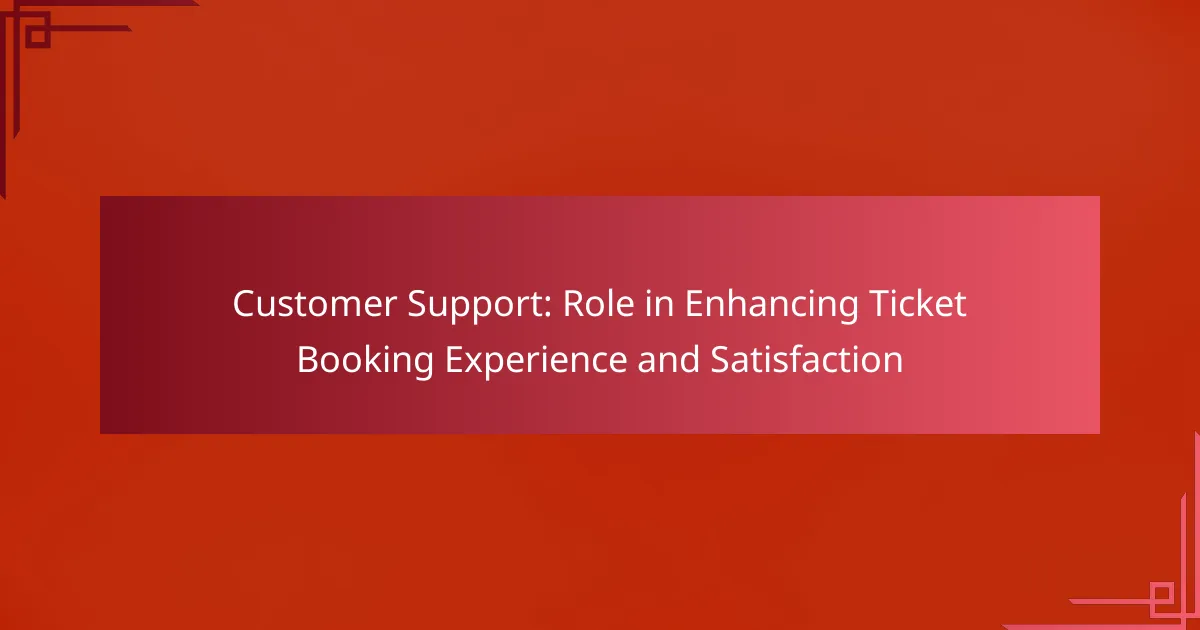Customer support plays a crucial role in enhancing the ticket booking experience by offering timely assistance and personalized guidance. By ensuring smooth navigation through the booking process, effective support not only resolves issues but also significantly boosts customer satisfaction. Key practices such as 24/7 availability and multi-channel support further streamline the experience, making it more efficient and enjoyable for users.
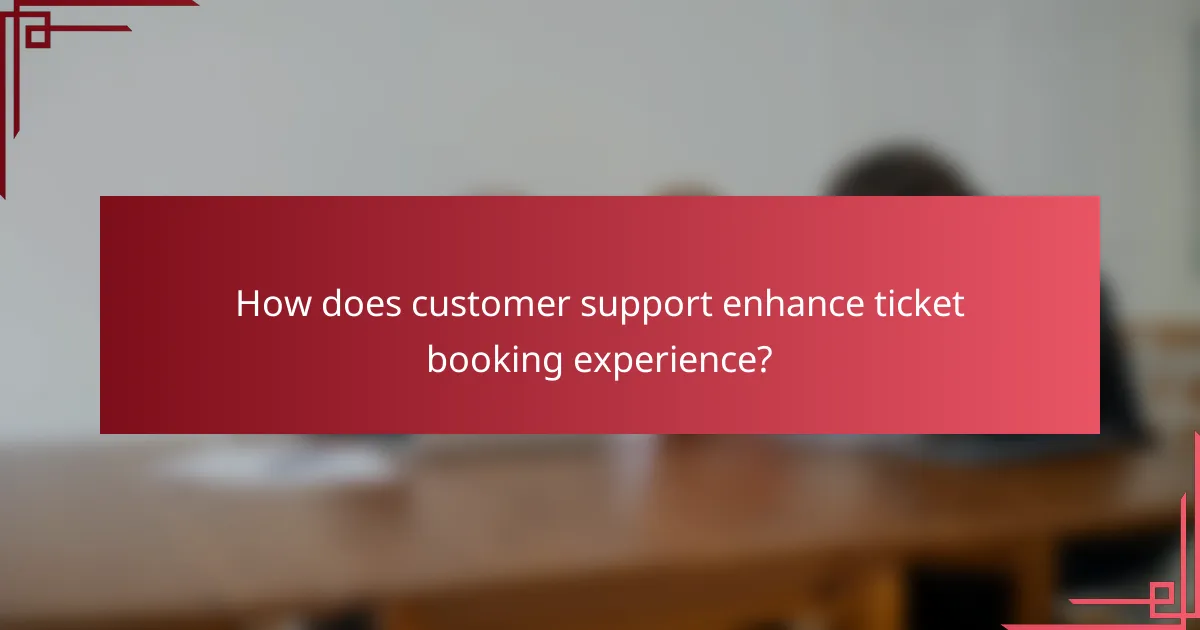
How does customer support enhance ticket booking experience?
Customer support significantly enhances the ticket booking experience by providing timely assistance, personalized guidance, and effective solutions to issues. This support ensures that customers can navigate the booking process smoothly, leading to higher satisfaction levels.
Improved response times
Quick response times are crucial in the ticket booking process, as customers often seek immediate answers to their inquiries. Efficient customer support teams can respond to queries within minutes, reducing frustration and helping customers make timely decisions.
To achieve improved response times, companies can implement live chat options or dedicated support hotlines. These channels allow customers to receive assistance without long wait times, enhancing their overall experience.
Personalized assistance
Personalized assistance tailors the support experience to individual customer needs, making them feel valued. Support agents can access customer profiles to offer recommendations based on previous bookings, preferences, or travel history.
For instance, if a customer frequently books flights to a specific destination, agents can highlight relevant deals or provide information about related services. This level of personalization can lead to increased customer loyalty and repeat bookings.
Effective issue resolution
Effective issue resolution is essential for maintaining customer satisfaction during the ticket booking process. When problems arise, such as payment errors or booking changes, prompt and knowledgeable support can quickly address these concerns.
To ensure effective resolution, support teams should be well-trained and equipped with the necessary tools to handle various scenarios. Providing clear guidelines and maintaining open communication channels can help prevent misunderstandings and ensure that customers leave the interaction satisfied.
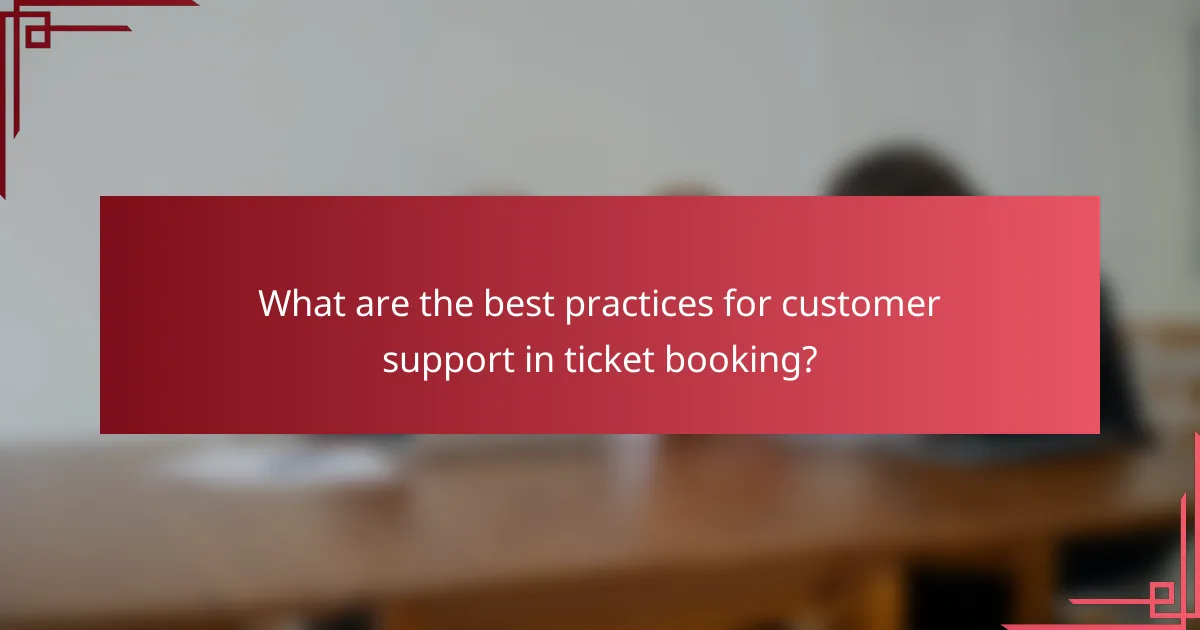
What are the best practices for customer support in ticket booking?
Effective customer support in ticket booking enhances user satisfaction and streamlines the booking process. Key practices include ensuring 24/7 availability, offering multi-channel support, and maintaining proactive communication with customers.
24/7 availability
Providing 24/7 availability for customer support is crucial in the ticket booking industry, as travelers often need assistance outside regular business hours. This ensures that customers can get help whenever they encounter issues, whether it’s late at night or during holidays.
To implement this, consider using a combination of live agents and automated systems like chatbots. This approach allows for immediate responses to common inquiries while still offering human support for more complex issues.
Multi-channel support
Multi-channel support allows customers to reach out through various platforms, such as phone, email, live chat, and social media. This flexibility caters to different preferences and increases the likelihood of customer satisfaction.
When setting up multi-channel support, ensure that all channels are integrated so that customer interactions are seamless. For example, if a customer starts a conversation on social media, they should be able to continue it via email without losing context.
Proactive communication
Proactive communication involves reaching out to customers before they encounter issues, which can significantly enhance their booking experience. This can include sending reminders about upcoming trips, updates on flight changes, or alerts about potential delays.
To effectively implement proactive communication, utilize automated messaging systems to send timely notifications. Additionally, consider offering personalized messages based on customer preferences and past interactions, which can foster a stronger relationship and increase loyalty.
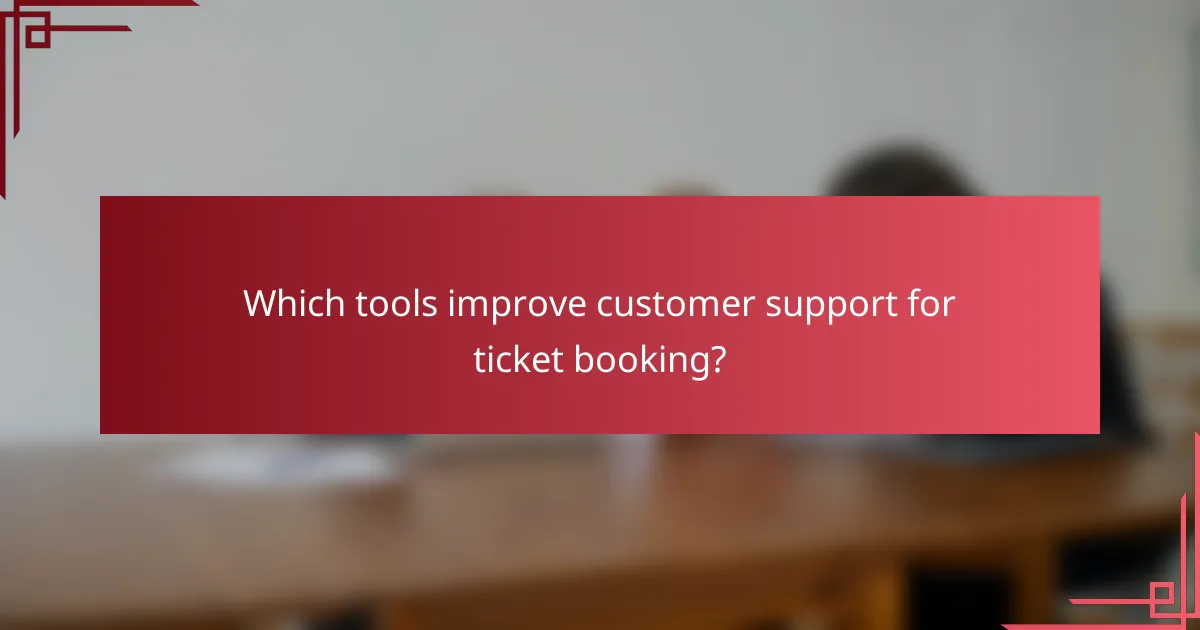
Which tools improve customer support for ticket booking?
Several tools significantly enhance customer support for ticket booking, including integrated platforms that streamline communication and manage customer interactions effectively. Utilizing these tools can lead to faster response times and improved customer satisfaction.
Zendesk integration
Zendesk integration allows ticket booking services to centralize customer inquiries and support requests in one platform. This tool offers features like ticket tracking, automated responses, and a comprehensive knowledge base, which can help reduce response times and improve service quality.
By implementing Zendesk, businesses can categorize and prioritize support tickets, ensuring that urgent issues are addressed promptly. Additionally, its reporting features provide insights into customer support performance, helping to identify areas for improvement.
Live chat software
Live chat software facilitates real-time communication between customers and support agents, enhancing the ticket booking experience. This tool allows customers to ask questions and receive immediate assistance, which can significantly reduce the time spent on resolving issues.
When choosing live chat software, consider features like chatbots for initial inquiries, mobile compatibility, and integration with existing systems. Offering live chat can increase customer satisfaction by providing quick solutions and reducing frustration during the booking process.
CRM systems
Customer Relationship Management (CRM) systems play a crucial role in managing customer interactions and data throughout the ticket booking journey. A CRM can help track customer preferences, previous interactions, and feedback, enabling personalized support and targeted marketing efforts.
When selecting a CRM, look for features that integrate with ticket booking platforms and support automation of routine tasks. This integration can streamline processes and ensure that customer support teams have access to relevant information, ultimately enhancing the overall customer experience.

What metrics measure customer support effectiveness?
Customer support effectiveness can be measured using various metrics that reflect how well the support team addresses customer needs. Key metrics include customer satisfaction score, first response time, and ticket resolution rate, each providing insights into different aspects of the support experience.
Customer satisfaction score
The customer satisfaction score (CSAT) gauges how satisfied customers are with the support they receive. Typically measured through surveys, customers rate their experience on a scale, often from 1 to 5 or 1 to 10. A higher score indicates better service quality and can help identify areas for improvement.
To effectively use CSAT, consider surveying customers shortly after their interaction with support. Aim for a score above 80% to indicate strong satisfaction, but also track trends over time to see if improvements are needed.
First response time
First response time measures how quickly a support team acknowledges a customer’s inquiry. This metric is crucial because a prompt response can significantly enhance customer perception and satisfaction. Ideally, first responses should occur within a few minutes to a couple of hours, depending on the support channel.
To improve first response times, implement automated responses for ticket acknowledgments and ensure adequate staffing during peak hours. Regularly review response times to identify patterns and adjust resources as necessary.
Ticket resolution rate
The ticket resolution rate indicates the percentage of customer issues that are successfully resolved by the support team. A high resolution rate suggests effective problem-solving capabilities, while a low rate may highlight underlying issues in processes or training. Aim for a resolution rate of at least 70% to 90% for optimal performance.
To enhance ticket resolution rates, invest in training for support staff and utilize knowledge bases that empower agents to find solutions quickly. Regularly analyze unresolved tickets to identify common challenges and develop strategies to address them effectively.
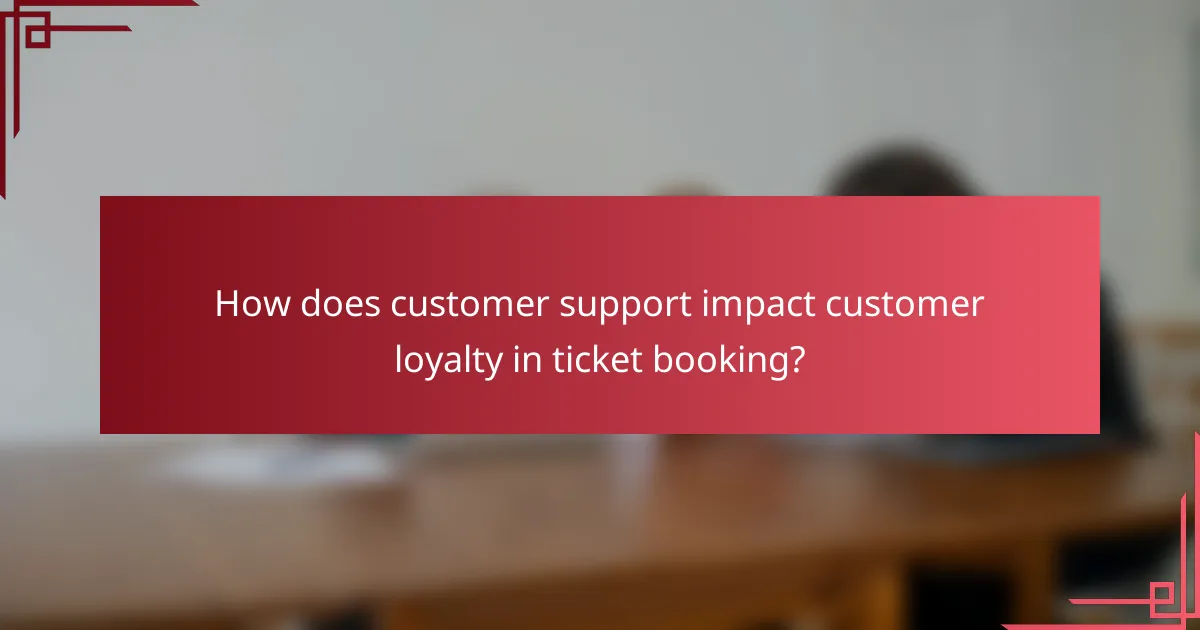
How does customer support impact customer loyalty in ticket booking?
Customer support significantly influences customer loyalty in ticket booking by providing assistance and resolving issues promptly. A positive support experience can lead to increased trust and satisfaction, encouraging customers to return for future bookings.
Increased repeat bookings
Effective customer support can lead to increased repeat bookings by ensuring a seamless experience for travelers. When customers feel valued and supported, they are more likely to choose the same service for future trips. Quick resolution of issues, such as booking changes or cancellations, can further enhance this loyalty.
For example, if a customer encounters a problem with their ticket and receives immediate assistance, they are likely to remember that positive experience when planning their next trip. This can translate into a higher likelihood of returning to the same provider.
Positive reviews and referrals
High-quality customer support often results in positive reviews and referrals, which are crucial for attracting new customers in the ticket booking industry. Satisfied customers are more inclined to share their experiences on social media and review platforms, enhancing the company’s reputation.
Encouraging customers to leave feedback after their support interactions can amplify this effect. For instance, a simple follow-up email asking for a review can lead to valuable testimonials that influence potential customers’ decisions.
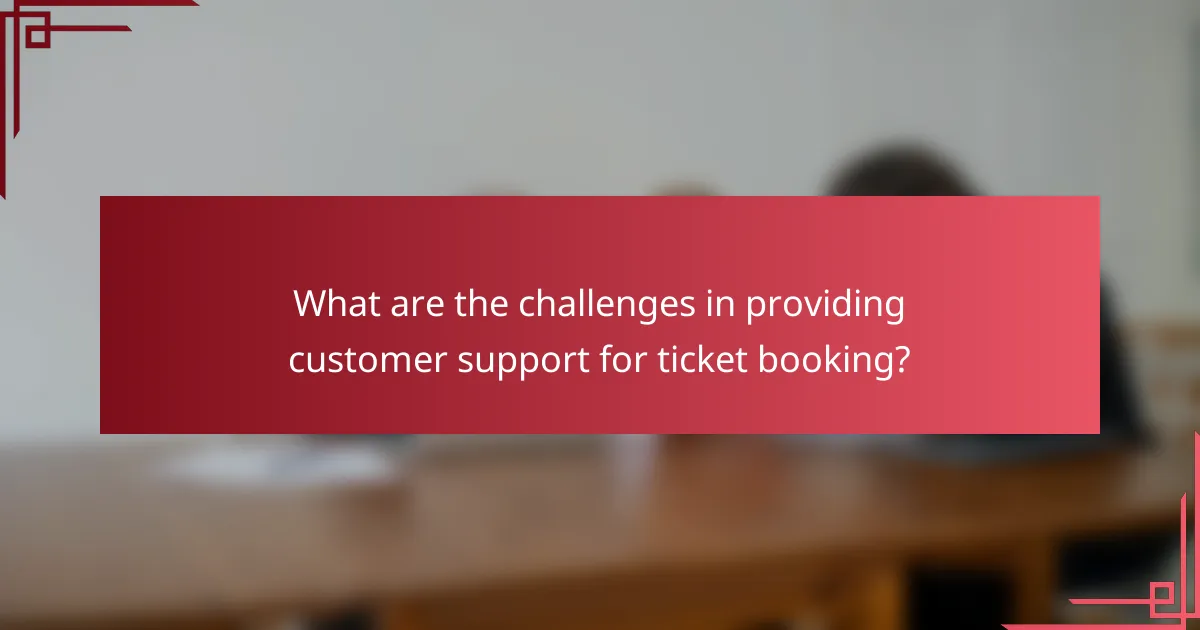
What are the challenges in providing customer support for ticket booking?
Providing customer support for ticket booking involves several challenges, including managing a high volume of inquiries and ensuring staff are adequately trained. These factors can significantly impact the efficiency of the support process and overall customer satisfaction.
High volume of inquiries
Customer support teams often face a high volume of inquiries, especially during peak travel seasons or major events. This influx can lead to longer response times, which may frustrate customers seeking immediate assistance.
To manage this challenge, support teams can implement automated systems, such as chatbots, to handle common questions. Additionally, prioritizing inquiries based on urgency can help ensure that critical issues are addressed promptly.
Staff training requirements
Effective customer support for ticket booking requires staff to be well-trained in the booking system, policies, and customer service techniques. Inadequate training can lead to misinformation and poor customer experiences.
Regular training sessions and updates on new features or policies are essential. Providing staff with access to a knowledge base can also empower them to resolve issues quickly and accurately, enhancing the overall support experience.
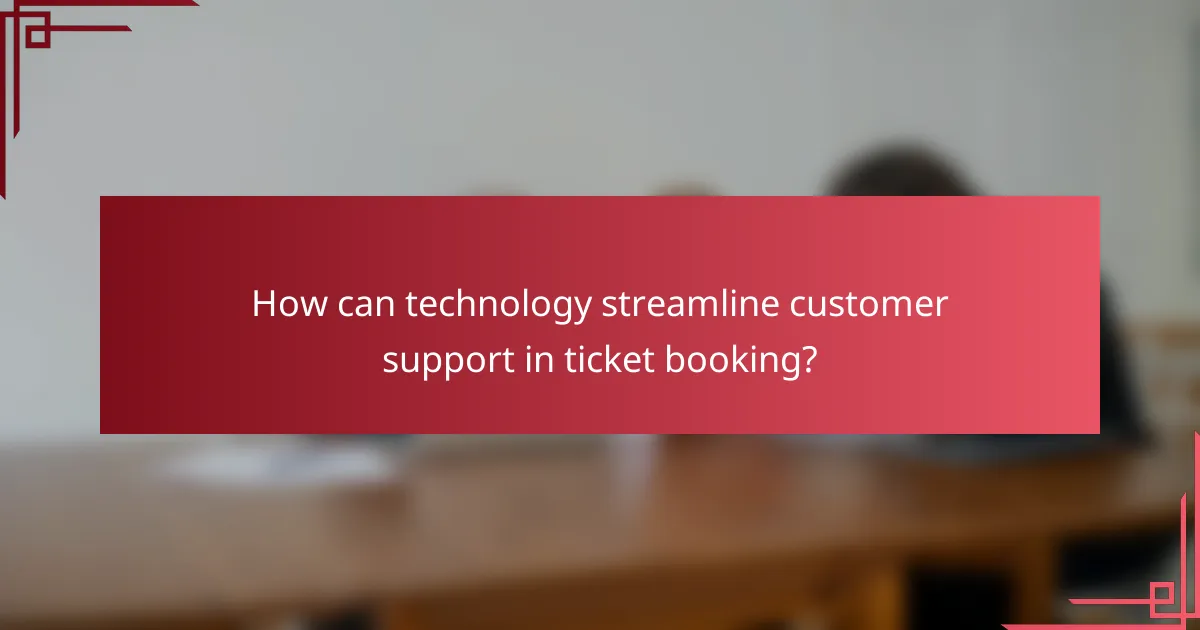
How can technology streamline customer support in ticket booking?
Technology can significantly enhance customer support in ticket booking by automating processes and improving communication. Tools like chatbots, AI-driven systems, and integrated platforms help streamline inquiries, reduce wait times, and provide personalized assistance.
Automated Response Systems
Automated response systems, such as chatbots, can handle common customer inquiries instantly. These systems can provide information on ticket availability, pricing, and booking procedures without human intervention, leading to quicker resolutions.
Implementing a chatbot can reduce response times to mere seconds, allowing customers to receive immediate assistance. However, it’s crucial to ensure that these systems can escalate complex issues to human agents when necessary.
AI-Powered Customer Insights
AI technology can analyze customer interactions to identify trends and preferences. By understanding customer behavior, companies can tailor their support strategies, ensuring that the most common issues are addressed proactively.
For instance, if data shows frequent inquiries about a specific event, support teams can prepare FAQs or alerts to streamline the booking process. This proactive approach enhances customer satisfaction and reduces repetitive inquiries.
Integrated Support Platforms
Integrated support platforms combine various communication channels, allowing customers to reach out via email, chat, or social media. This centralization ensures that customer queries are tracked and managed efficiently across different platforms.
Using an integrated system can improve response consistency and ensure that customers receive timely updates about their bookings. It’s advisable to choose a platform that offers real-time updates and analytics to monitor performance effectively.
